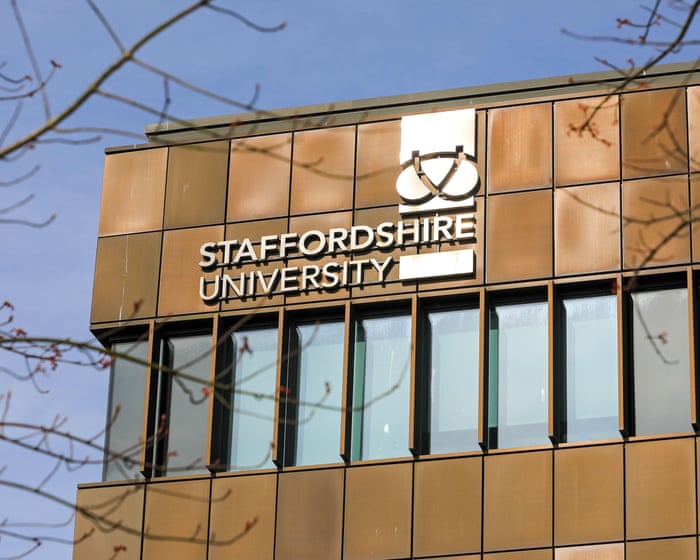Students at Staffordshire University feel “robbed of knowledge and enjoyment” after discovering that a course intended to launch their digital careers was largely taught using AI.
James and Owen were among 41 students who enrolled in a coding module last year through a government-funded apprenticeship program, aiming to become cybersecurity experts or software engineers. However, after a term of AI-generated slides sometimes narrated by an AI voice, James expressed a loss of faith in the program and its administrators. He worries he has “used up two years” of his life on a course delivered “in the cheapest way possible.”
“If we submitted AI-generated work, we’d be expelled, but we’re being taught by an AI,” James told his lecturer during a confrontation recorded in October 2024 as part of the course.
James and fellow students repeatedly raised concerns with university officials about the AI materials, but the institution continues to use them. This year, the university posted a policy on the course website that appears to justify AI use, outlining “a framework for academic professionals leveraging AI automation” in teaching and scholarly work.
The university’s public policies restrict students’ use of AI, stating that those who submit AI-generated work as their own violate academic integrity and may face misconduct charges.
“I’m midway through my life and career,” James said. “I don’t feel I can just walk away and start over. I’m stuck with this course.”
The situation at Staffordshire reflects a broader trend of universities adopting AI tools for teaching, generating materials, and providing feedback. A Department of Education policy paper in August praised this development, claiming generative AI “has the power to transform education.” A survey by Jisc of 3,287 higher education staff found nearly a quarter are using AI in their teaching.
For students, however, AI teaching seems more demoralizing than transformative. In the US, students leave negative reviews for professors who use AI, while UK undergraduates complain on Reddit about lecturers using ChatGPT for feedback or AI-generated images in courses.
“I understand the pressures on lecturers that might lead them to use AI, but it’s disheartening,” one student wrote.
James and Owen noticed AI use in their Staffordshire course “almost immediately” last year when, in the first class, the lecturer played a PowerPoint with an AI version of his voice reading the slides. They soon observed other signs of AI-generated content, such as American English inconsistently edited to British English, suspicious file names, and “generic, surface-level information” that sometimes referenced US legislation without explanation.
Evidence of AI-generated material persisted this year. In one course video, the narration abruptly shifts to a Spanish accent for about 30 seconds before reverting to a British accent.
The Guardian examined materials from the Staffordshire course and used two AI detectors—Winston AI and Originality AI—to scan this year’s content. Both indicated that several assignments and presentations had “a very high likelihood of being AI-generated.”
Early in the course, James raised his concerns with the student representative during a monthly meeting, and again in late November.During a recorded lecture, a student named James voiced his concerns about the course materials. He noticed the slides were AI-generated and asked the lecturer to discard them, stating, “I know these slides are AI-generated, and I believe everyone here is aware of that. I’d prefer if you just got rid of them. I don’t want to be taught by GPT.”
The student representative for the course then added, “We’ve already given this feedback, James, and the response was that instructors are permitted to use various tools. We found that reply quite frustrating.”
Another student commented, “There are a few useful points in the presentation, but it’s like only 5% is valuable, and the rest is repetitive. There’s some gold in there, but we could probably find it ourselves by asking ChatGPT.”
The lecturer responded with an uneasy laugh, saying, “I appreciate everyone’s honesty…” before shifting the topic to another tutorial he had created—also using ChatGPT. He admitted, “I put this together at short notice, to be honest.”
Later, the course head assured James that two human lecturers would cover the material in the final session to ensure “you don’t get an AI experience.”
When contacted by the Guardian, the University of Staffordshire stated that academic standards and learning outcomes were maintained in the course. They explained, “The University of Staffordshire supports the responsible and ethical use of digital technologies in accordance with our guidelines. AI tools can assist with preparation but do not replace academic expertise and must always be used to uphold academic integrity and sector standards.”
Although the university brought in a non-AI lecturer for the last lecture, James and Owen felt this was too little, too late, especially since the university seemed to have used AI in this year’s teaching materials as well.
James expressed, “I feel like a bit of my life was stolen.”
Owen, who is transitioning careers, shared that he enrolled in the course for the knowledge, not just the qualification, and found it to be a waste of time. He said, “Sitting there with material that isn’t worth anyone’s time, when you could be doing something meaningful, is really frustrating.”
Frequently Asked Questions
Of course Here is a list of FAQs about students protesting a course taught by AI designed to be clear concise and in a natural tone
General Beginner Questions
1 What exactly are the students protesting
Students are protesting because their course is being taught entirely by an artificial intelligence program arguing that they could have just used a free tool like ChatGPT on their own instead of paying tuition for it
2 Why are they comparing the AI course to ChatGPT
They feel that if the course content is just generated by an AI its no different from the answers they could get by asking questions to a publicly available AI like ChatGPT making the formal course seem unnecessary and overpriced
3 Whats the main problem with an AI teaching a course
The main issues are a lack of human interaction an inability for the AI to provide personalized mentorship or understand nuanced student struggles and concerns about the quality and originality of the education theyre paying for
4 Isnt using technology in education a good thing
Yes technology is a great tool for enhancing learning The protest is about replacing the human teacher entirely not about using technology to support one
Deeper Advanced Questions
5 What are the potential benefits of an AItaught course
Proponents argue it could offer 247 access to learning materials perfectly consistent delivery of information and the ability to scale education to a massive number of students at a low cost
6 What are the key drawbacks or risks
Risks include the AI presenting outdated or incorrect information a lack of critical thinking and debate that comes from human discussion no emotional support for students and potential biases embedded in the AIs training data
7 How is a structured AI course different from just using ChatGPT
A welldesigned course should have a curated curriculum defined learning objectives assignments graded with clear rubrics and a way to earn a certified credential Simply using ChatGPT is more like having an informal ondemand research assistant without that structure or official recognition
8 Couldnt the university just use AI as a teaching assistant instead
Absolutely This is a common compromise An AI can handle repetitive tasks like grading quizzes answering basic questions and providing practice problems freeing up the human professor to focus on advanced concepts mentorship and discussion



